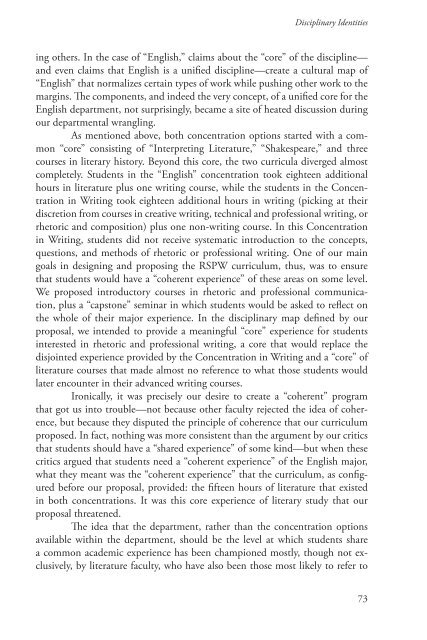Design Discourse- Composing and Revising Programs in Professional and Technical Writing, 2010a
Design Discourse- Composing and Revising Programs in Professional and Technical Writing, 2010a
Design Discourse- Composing and Revising Programs in Professional and Technical Writing, 2010a
Create successful ePaper yourself
Turn your PDF publications into a flip-book with our unique Google optimized e-Paper software.
Discipl<strong>in</strong>ary Identities<br />
<strong>in</strong>g others. In the case of “English,” claims about the “core” of the discipl<strong>in</strong>e—<br />
<strong>and</strong> even claims that English is a unified discipl<strong>in</strong>e—create a cultural map of<br />
“English” that normalizes certa<strong>in</strong> types of work while push<strong>in</strong>g other work to the<br />
marg<strong>in</strong>s. The components, <strong>and</strong> <strong>in</strong>deed the very concept, of a unified core for the<br />
English department, not surpris<strong>in</strong>gly, became a site of heated discussion dur<strong>in</strong>g<br />
our departmental wrangl<strong>in</strong>g.<br />
As mentioned above, both concentration options started with a common<br />
“core” consist<strong>in</strong>g of “Interpret<strong>in</strong>g Literature,” “Shakespeare,” <strong>and</strong> three<br />
courses <strong>in</strong> literary history. Beyond this core, the two curricula diverged almost<br />
completely. Students <strong>in</strong> the “English” concentration took eighteen additional<br />
hours <strong>in</strong> literature plus one writ<strong>in</strong>g course, while the students <strong>in</strong> the Concentration<br />
<strong>in</strong> Writ<strong>in</strong>g took eighteen additional hours <strong>in</strong> writ<strong>in</strong>g (pick<strong>in</strong>g at their<br />
discretion from courses <strong>in</strong> creative writ<strong>in</strong>g, technical <strong>and</strong> professional writ<strong>in</strong>g, or<br />
rhetoric <strong>and</strong> composition) plus one non-writ<strong>in</strong>g course. In this Concentration<br />
<strong>in</strong> Writ<strong>in</strong>g, students did not receive systematic <strong>in</strong>troduction to the concepts,<br />
questions, <strong>and</strong> methods of rhetoric or professional writ<strong>in</strong>g. One of our ma<strong>in</strong><br />
goals <strong>in</strong> design<strong>in</strong>g <strong>and</strong> propos<strong>in</strong>g the RSPW curriculum, thus, was to ensure<br />
that students would have a “coherent experience” of these areas on some level.<br />
We proposed <strong>in</strong>troductory courses <strong>in</strong> rhetoric <strong>and</strong> professional communication,<br />
plus a “capstone” sem<strong>in</strong>ar <strong>in</strong> which students would be asked to reflect on<br />
the whole of their major experience. In the discipl<strong>in</strong>ary map def<strong>in</strong>ed by our<br />
proposal, we <strong>in</strong>tended to provide a mean<strong>in</strong>gful “core” experience for students<br />
<strong>in</strong>terested <strong>in</strong> rhetoric <strong>and</strong> professional writ<strong>in</strong>g, a core that would replace the<br />
disjo<strong>in</strong>ted experience provided by the Concentration <strong>in</strong> Writ<strong>in</strong>g <strong>and</strong> a “core” of<br />
literature courses that made almost no reference to what those students would<br />
later encounter <strong>in</strong> their advanced writ<strong>in</strong>g courses.<br />
Ironically, it was precisely our desire to create a “coherent” program<br />
that got us <strong>in</strong>to trouble—not because other faculty rejected the idea of coherence,<br />
but because they disputed the pr<strong>in</strong>ciple of coherence that our curriculum<br />
proposed. In fact, noth<strong>in</strong>g was more consistent than the argument by our critics<br />
that students should have a “shared experience” of some k<strong>in</strong>d—but when these<br />
critics argued that students need a “coherent experience” of the English major,<br />
what they meant was the “coherent experience” that the curriculum, as configured<br />
before our proposal, provided: the fifteen hours of literature that existed<br />
<strong>in</strong> both concentrations. It was this core experience of literary study that our<br />
proposal threatened.<br />
The idea that the department, rather than the concentration options<br />
available with<strong>in</strong> the department, should be the level at which students share<br />
a common academic experience has been championed mostly, though not exclusively,<br />
by literature faculty, who have also been those most likely to refer to<br />
73


















